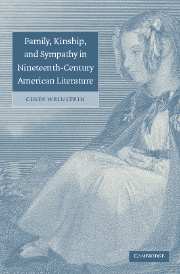Book contents
- Frontmatter
- Contents
- Acknowledgments
- Introduction
- 1 In loco parentis
- 2 “A sort of adopted daughter”: family relations in The Lamplighter
- 3 Thinking through sympathy: Kemble, Hentz, and Stowe
- 4 Behind the scenes of sentimental novels: Ida May and Twelve Years a Slave
- 5 Love American style: The Wide, Wide World
- 6 We are family, or Melville's Pierre
- Afterword
- Notes
- Select bibliography
- Index
- Cambridge Cultural Social Studies
1 - In loco parentis
Published online by Cambridge University Press: 22 September 2009
- Frontmatter
- Contents
- Acknowledgments
- Introduction
- 1 In loco parentis
- 2 “A sort of adopted daughter”: family relations in The Lamplighter
- 3 Thinking through sympathy: Kemble, Hentz, and Stowe
- 4 Behind the scenes of sentimental novels: Ida May and Twelve Years a Slave
- 5 Love American style: The Wide, Wide World
- 6 We are family, or Melville's Pierre
- Afterword
- Notes
- Select bibliography
- Index
- Cambridge Cultural Social Studies
Summary
O, there is affection stronger than any of this earth. It has a power, a beauty, a holiness, like no other sentiment.
(The Reverend E. H. Chapin, “A Mother's Love”)The Mother's Assistant and Young Lady's Friend was one of many popular advice manuals in the mid nineteenth century which presented its primarily female audience with a menu of articles, short stories, poems, and adages to aid them in the strenuous work of raising children. Its pages instruct her in a variety of childrearing departments, such as the proper forms of discipline, the ideal educational regimen, and the implementation of Christian values and practices. Titles range from “The Influence of a Sister,” “Family Education,” “Obedience of Children,” or “Maternal Assistance,” but the message to mothers is always the same: “the mother must watch carefully, that she does not mistake here.” The “here” is, of course, everywhere, making the task of mothering not only monumental but monumentally difficult. The necessity of constant watchfulness, of her own behavior as well as her children's (not to mention her husband's), signifies both her power within the domestic realm and, as many have argued, her containment within it. She must consider her every action, every look, every feeling because, as one article entitled, “The Silent Ministry of Example,” reminds her: “an inconsistent word, a sullen look, a contention with her husband, or her servants; petulance from an error, or an unhappy lot, will dash in pieces the lessons of months.”
- Type
- Chapter
- Information
- Publisher: Cambridge University PressPrint publication year: 2004

